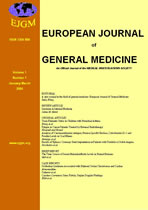
|
European Journal of General Medicine
Medical Investigations Society
ISSN: 1304-3897
Vol. 7, No. 3, 2010, pp. 277-281
|
 Bioline Code: gm10053
Bioline Code: gm10053
Full paper language: English
Document type: Research Article
Document available free of charge
|
|
|
European Journal of General Medicine, Vol. 7, No. 3, 2010, pp. 277-281
| tr |
Epstein-Barr virus ilişkili Nazofaringeal Karsinomada CD4, CD8 ve MHC Klas I Ekspresyonu: İmmunohistokimyasal Çalışma
Budiani, Dyah R.; Haryana, Sofia M.; Soesatyo, Marsetyawan H.N.E. & Sosroseno, Wihaskoro
Amaç: Epstein-Barr virus (EBV) ilişkili Nazofarengeal Karsinomun (NFK) immunopatogenezi tam olarak aydınlatılamamıştır. Bu çalışmanın amacı, NPC de CD4, CD8 ve MHC Klas I ekspresyonunun araştırmaktır
Metod: NFK tanults of the present study suggest, therefore, that the expression of CD4, CD8 and MHC class I molecules may not be associated with the pathologic classification and clinical staging of NPC and that the CD4:CD8 ratio in nasopharyngeal carcinoma may indicate decreased functions of these infiltrating T cell subsets.
Bulgular: CD4 pozitif, CD8 pozitif ve MHC Klas I pozitiflik miktarı NFK hücrelerinde EBV negatif guruba göre yüksek bulundu (p<0.05). WHO Tip 2 veya erken evre NFK daki pozitif hücre sayısı ile WHO Tip 3 veya geç evre arasında istatistiksel olarak fark yoktu (p>0.05). NFK hastalarında CD4 pozitif hücre sayısı ile CD8 pozitif hücre sayısı arasında istatistiksel olarak fark yoktu (p>0.05).
Sonuç: CD4, CD8 ve MHC Klas I moleküllerinin ekspresyonunun NFK hastalarında patolojik sınıflandırma ve klinik evreleme ile alakalı olmadığını, nasofarenks karsinomunda CD4/CD8 oranı infiltre eden T hücre alt gurublarının fonksiyonunda azalma olduğuna işaret etmektedir.
CD4; CD8; MHC klas I; NFK
|
| |
| en |
CD4, CD8 and MHC Class I Expression in Epstein-Barr Virus-Associated Nasopharyngeal Carcinoma: An Immunohistochemical Study
Budiani, Dyah R.; Haryana, Sofia M.; Soesatyo, Marsetyawan H.N.E. & Sosroseno, Wihaskoro
Abstract
Aim: The exact immunopathogenesis of Epstein-Barr virus (EBV)-associated nasopharyngeal carcinoma (NPC) remains unclear. The aim of the present study was to assess the expression of CD4, CD8, and MHC class I molecules in NPC.
Method: Biopsies were obtained from patients with NPC as well as the Epstein Barr virus (EBV)-seronegative patients as a control. Nasopharyngeal carcinoma patients were classified using the World Health Organization (WHO) pathological assessment and clinical staging of NPC. The expression of CD4, CD8, and MHC class I in the biopsies were assessed immunohistochemically.
Result: The results showed that the number of CD4 positive, CD8 positive, and MHC class I positive cells in NPC patients were higher than those in EBV-negative subjects (p<0.05). The number of these positive cells in NPC patients with WHO Type II or early clinical stage was not significantly differences with those with WHO Type III or late clinical stage, respectively (p>0.05). No statistical differences between the number of CD4 positive and CD8 positive cells in NPC patients could be found (p>0.05).
Conclusion: The results of the present study suggest, therefore, that the expression of CD4, CD8 and MHC class I molecules may not be associated with the pathologic classification and clinical staging of NPC and that the CD4:CD8 ratio in nasopharyngeal carcinoma may indicate decreased functions of these infiltrating T cell subsets.
Keywords
CD4; CD8; MHC class I; NPC
|
| |
© Copyright 2010 European Journal of General Medicine.
Alternative site location: http://www.ejgm.org
|
|
